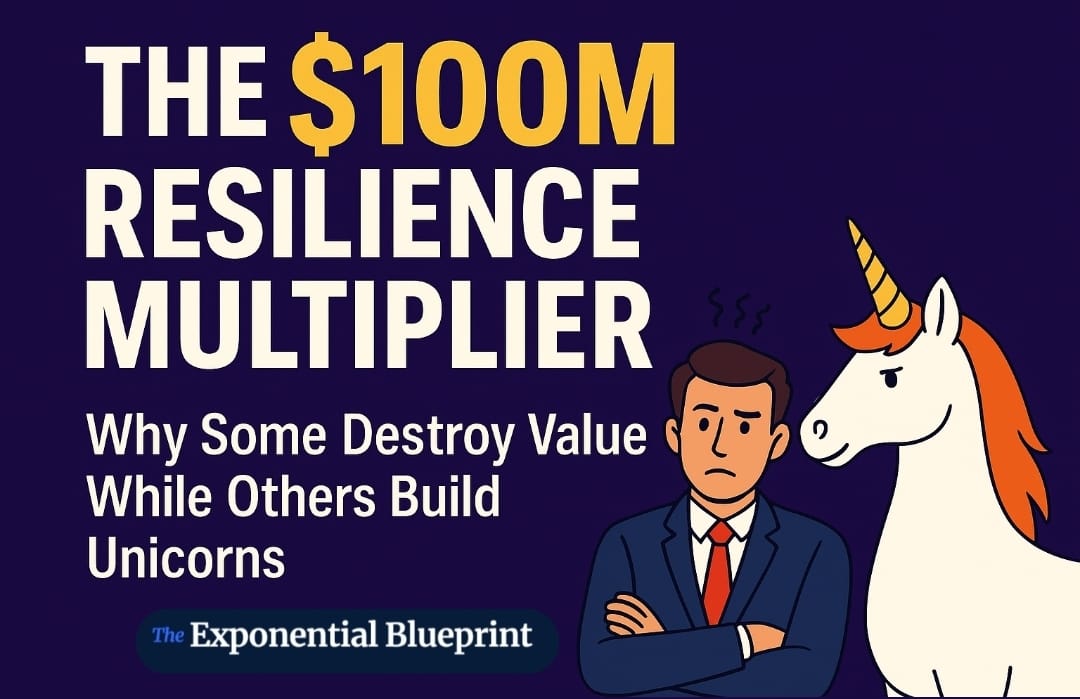- The Exponential Blueprint
- Posts
- The $100M Resilience Multiplier
The $100M Resilience Multiplier
Why Some Destroy Value While Others Build Unicorns


The Failure Dilemma
Entrepreneurs are often told to “fail fast.” It’s become startup gospel, whispered in accelerator halls and plastered on coffee mugs in coworking spaces.
But here’s the harsh truth: not all failures are equal.
Some failures are destructive. They burn cash, damage reputations, and leave founders exhausted with nothing to show for it.
Other failures, however, are the raw material for unicorns. They generate priceless data, reveal hidden opportunities, and set the stage for pivots that lead to extraordinary valuations.
The difference between these two paths — destructive failure and pivot-driven failure — is what determines whether your business becomes a forgotten footnote or a billion-dollar case study.
Keep This Stock Ticker on Your Watchlist
They’re a private company, but Pacaso just reserved the Nasdaq ticker “$PCSO.”
No surprise the same firms that backed Uber, eBay, and Venmo already invested in Pacaso. What is unique is Pacaso is giving the same opportunity to everyday investors. And 10,000+ people have already joined them.
Created a former Zillow exec who sold his first venture for $120M, Pacaso brings co-ownership to the $1.3T vacation home industry.
They’ve generated $1B+ worth of luxury home transactions across 2,000+ owners. That’s good for more than $110M in gross profit since inception, including 41% YoY growth last year alone.
And you can join them today for just $2.90/share. But don’t wait too long. Invest in Pacaso before the opportunity ends September 18.
Paid advertisement for Pacaso’s Regulation A offering. Read the offering circular at invest.pacaso.com. Reserving a ticker symbol is not a guarantee that the company will go public. Listing on the NASDAQ is subject to approvals.
Destructive Failure: When Failure Ends the Story
Destructive failure happens when founders ignore signals, cling to broken assumptions, or double down on the wrong path. Instead of treating early failure as feedback, they treat it as an attack on their identity.
Take Juicero, the infamous $120M Silicon Valley startup.
The company promised to reinvent juice with a Wi-Fi-enabled press.
Customers quickly discovered they could squeeze the juice packs by hand, making the machine obsolete.
Instead of pivoting to a subscription model, brand licensing, or even repositioning as a health data company, Juicero doubled down on expensive hardware.
Result? Collapse within a few years, leaving investors embarrassed and employees disillusioned.
Juicero didn’t just fail — it failed destructively. The mistake wasn’t the product. It was the refusal to pivot when the writing was on the wall.
Do Not Let Financial Failures Drain You
In business, we talk about destructive vs. pivot-driven failures. The same applies to your personal finances. Why let money leak out every month on overpriced insurance when you can pivot to a smarter deal?
I’ve partnered with Quotezone to give you quick, no-nonsense comparisons for car, van, and home insurance. It only takes a couple of minutes, and many find they save hundreds each year.
This section contains an affiliate link. If you purchase through it, I may earn a commission — at no extra cost to you.
Pivot-Driven Failure: When Failure Fuels Success
Contrast that with Slack.
Slack wasn’t born as a workplace communication tool. It started as a failed online game called Glitch. The game had potential, but it never gained traction. Most founders would have folded and moved on.
Instead, the team noticed that one element of Glitch was working beautifully: the internal messaging system they built to collaborate.
So they pivoted.
They took the failure of the game and transformed it into the foundation for a global SaaS powerhouse. Slack sold to Salesforce for $27.7B in 2021.
This is pivot-driven failure.
Failure wasn’t the end. It was the feedback loop that unlocked the real opportunity.
Join The Private Market Listing Revolution!
Below is Part 3 of my Podcast with James Hunt, Private Market Expert.
Discover how employee share schemes are the key to many successful business stories and how private market listing can help this.
The Anatomy of Pivot-Driven Failure
So what separates destructive failure from pivot-driven failure? Three things:
Mindset — Founders who see failure as data rather than defeat are positioned to adapt.
Speed — Pivot-driven companies act quickly. They don’t wait until the cash is gone. They pivot while they still have runway.
Alignment — Successful pivots align with a company’s core strengths. Slack’s pivot wasn’t random. It leveraged a tool the team already loved and mastered.
Case Study: Netflix
Netflix is one of the greatest examples of pivot-driven failure in history.
In the early 2000s, Netflix was bleeding cash. DVDs-by-mail was expensive, slow, and clunky. Blockbuster was still king.
But Reed Hastings didn’t see failure as final. He saw it as feedback. Customers wanted convenience, not plastic discs.
Netflix pivoted to streaming — and then pivoted again into content creation.
The result? A $250B valuation and a company that redefined entertainment.
What if Hastings had clung to DVDs the way Juicero clung to its machines? Netflix would be a cautionary tale, not a global giant.
Below is our podcast with Veronika Oswald, Director of JP Jenkins.
The show is “Invisible to Investable Founders”
JP Jenkins is the UK’s pioneering private market platform since 1991. Together, we explore how companies can transform from being overlooked to becoming investable — without waiting for an IPO.
Why Investors Love Pivot-Driven Failure
Here’s the part most founders miss: investors don’t expect perfection.
What they expect is resilience.
Data shows:
Startups that survive at least one pivot are 300% more likely to achieve a successful exit.
Companies that demonstrate a successful pivot raise 10x more funding than those that don’t.
Investors aren’t backing your first idea. They’re backing your ability to adapt. They know markets shift, technology evolves, and customers surprise us. What they want to see is whether you have the courage and discipline to pivot when it matters.
Signs You’re Facing Destructive Failure
Every founder should watch for these red flags:
Customer apathy — not hate, not resistance, just silence. Indifference means your solution isn’t solving a real pain point.
Revenue without retention — people try your product, but they don’t stay. That’s a model problem, not a marketing problem.
Rising costs without scaling returns — if growth requires exponential spend with flat results, you’re trapped.
Investor skepticism — if backers ask about pivots and you dismiss them, you’re signaling rigidity, not resilience.
Ignore these, and you’re walking into destructive failure.
How to Fail Smart (and Pivot Right)
So how do you transform failure into fuel?
Listen to the data, not your ego. Failure hurts. But hidden in the rubble are insights. Amazon didn’t cling to books. They listened, expanded, and pivoted into categories with more leverage.
Preserve your runway. You can’t pivot if you’re broke. Smart founders cut costs early to buy time for reinvention.
Leverage strengths. Slack succeeded because its pivot built on what the team already excelled at. Don’t pivot into unknown territory. Pivot into your advantage.
Frame the pivot for investors. Investors respect founders who can say: “Here’s what we learned, here’s what we’re changing, and here’s why the pivot unlocks more value.”
The High Valuation Lesson
Here’s the truth:
Failing fast without learning is reckless.
Failing smart with a pivot creates valuation.
This is why pivoting is the missing link in the Fail → Pivot → Scale cycle.
Fail gives you data.
Pivot transforms that data into a new direction.
Scale takes the pivot and multiplies it into value.
Without the pivot, failure is just destruction. With it, failure becomes the raw material for billion-dollar businesses.
Our M&A Expert Corner, Marguerite Bolze from Indonesia
Regulatory Frameworks, Legal Systems and their impact in M&A
Beyond cultural clashes, different countries have distinct legal and regulatory frameworks that pose significant hurdles during a cross-border M&A.
These differences affect everything from due diligence to post-merger integration. For example, a deal might face a variety of antitrust and competition laws from regulators in different countries, each with its own standards for preventing monopolies.
A merger between two global tech giants could face intense scrutiny from China's State Administration for Market Regulation (SAMR) or the Japan Fair Trade Commission (JFTC), which have different criteria and enforcement powers.
Additionally, labor and employment laws vary dramatically; a company with "at-will" employment might struggle to navigate the strong employee protections and works council requirements in a country like South Korea or Taiwan.
Disparate data privacy regulations, such as those in China or Singapore, can require significant investment and operational changes to ensure compliance.
Finally, differences in taxation and corporate governance rules can complicate a deal's structure and post-merger financial planning.
Capture the value from your M&A! Schedule a call with us!
Marguerite Bolze
Below is our podcast with Marguerite Bolze
Closing Inspiration
Every founder will fail. The question is: will you fail destructively, or will you fail smart?
Remember:
Juicero failed destructively.
Slack failed smart.
Netflix failed smart.
Amazon failed smart.
The winners don’t avoid failure. They embrace it, learn from it, and pivot until they scale.
That’s the code.
That’s the difference.
That’s why valuation belongs to the resilient, not the perfect.
Fail. Pivot. Scale and Your High Valuation Code
💡 Want to know if your business is in Fail, Pivot, or Scale right now?
Inside the Fail. Pivot. Scale. Premium Newsletter (launching September 16th), you’ll get:
Interactive Pivot Scorecards to diagnose your stage.
Case studies of 21 companies that turned failure into unicorns.
Valuation playbooks to help you fail smart and scale strong.
To your Exponential Success!
Matteo Turi
CFO & Mergers and Acquisition Expert



Reply